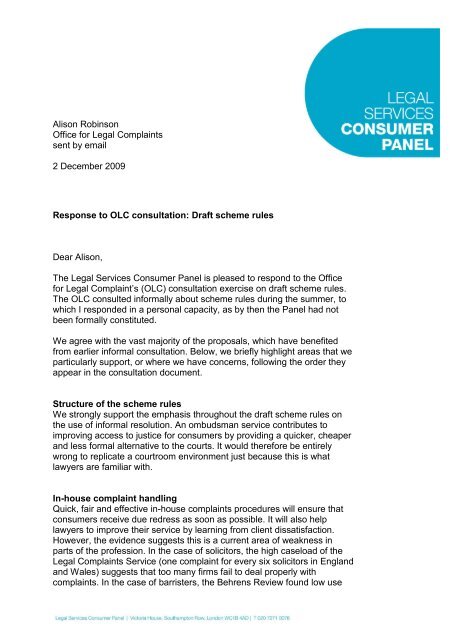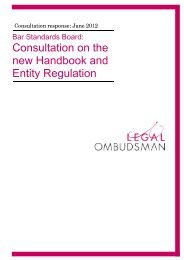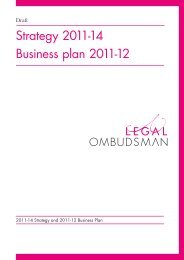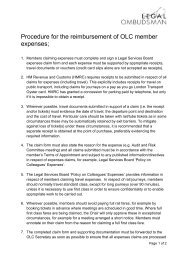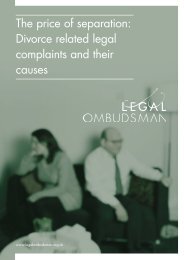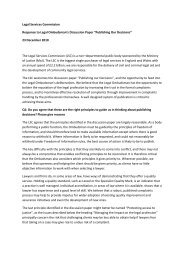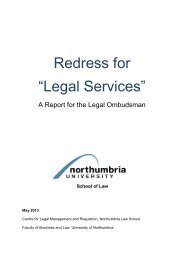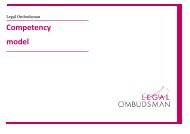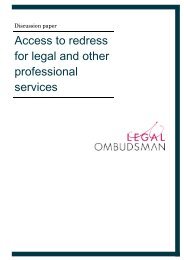Alison Robinson Office for Legal Complaints sent by email 2 ...
Alison Robinson Office for Legal Complaints sent by email 2 ...
Alison Robinson Office for Legal Complaints sent by email 2 ...
You also want an ePaper? Increase the reach of your titles
YUMPU automatically turns print PDFs into web optimized ePapers that Google loves.
<strong>Alison</strong> <strong>Robinson</strong><strong>Office</strong> <strong>for</strong> <strong>Legal</strong> <strong>Complaints</strong><strong>sent</strong> <strong>by</strong> <strong>email</strong>2 December 2009Response to OLC consultation: Draft scheme rulesDear <strong>Alison</strong>,The <strong>Legal</strong> Services Consumer Panel is pleased to respond to the <strong>Office</strong><strong>for</strong> <strong>Legal</strong> Complaint’s (OLC) consultation exercise on draft scheme rules.The OLC consulted in<strong>for</strong>mally about scheme rules during the summer, towhich I responded in a personal capacity, as <strong>by</strong> then the Panel had notbeen <strong>for</strong>mally constituted.We agree with the vast majority of the proposals, which have benefitedfrom earlier in<strong>for</strong>mal consultation. Below, we briefly highlight areas that weparticularly support, or where we have concerns, following the order theyappear in the consultation document.Structure of the scheme rulesWe strongly support the emphasis throughout the draft scheme rules onthe use of in<strong>for</strong>mal resolution. An ombudsman service contributes toimproving access to justice <strong>for</strong> consumers <strong>by</strong> providing a quicker, cheaperand less <strong>for</strong>mal alternative to the courts. It would there<strong>for</strong>e be entirelywrong to replicate a courtroom environment just because this is whatlawyers are familiar with.In-house complaint handlingQuick, fair and effective in-house complaints procedures will ensure thatconsumers receive due redress as soon as possible. It will also helplawyers to improve their service <strong>by</strong> learning from client dissatisfaction.However, the evidence suggests this is a current area of weakness inparts of the profession. In the case of solicitors, the high caseload of the<strong>Legal</strong> <strong>Complaints</strong> Service (one complaint <strong>for</strong> every six solicitors in Englandand Wales) suggests that too many firms fail to deal properly withcomplaints. In the case of barristers, the Behrens Review found low use
among barristers of local resolution to deal with complaints. The Reviewconcluded this resulted in some complaints being considered <strong>by</strong> theregulatory authority when they could have been resolved in Chambers.The consultation has to some extent been overtaken <strong>by</strong> events, as theLSB has decided to introduce a rule using its powers under section 112 ofthe Act making it clear to consumers that they have a right to complain andto whom. The LSB has also indicated it wishes to work with approvedregulators and others to reach agreement on effective complaints handlingoutcomes without having to use its statutory powers to imposerequirements. As a body that has the opportunity to observe first-tiercomplaint handling at close hand, the OLC is well placed to assist the LSBand its partners to identify such outcomes.Who can complain?We agree with proposals on the jurisdiction of the scheme, includingmaking clubs, associations and societies eligible complainants, in additionto micro-enterprises, small charities and trusts as originally proposed. Thisis consistent with the spirit of the <strong>Legal</strong> Services Act, which recognised themany different types of consumer of legal services. The Consumer Panelhas interpreted its own remit in this context, <strong>by</strong> choosing to prioritise thoseconsumers who are less able to give voice to their own interests. Theabove categories of consumer, alongside individual retail consumers, aremost likely to meet this principle, but there may be others. We hope theOLC will use its discretion on a case-<strong>by</strong>-case basis to consider other typesof complainant, who may be similarly disadvantaged because they do nothave deep enough pockets to access other avenues of redress.However, we would urge the OLC to rethink its definition of a small charity.The current definition appears to mirror that <strong>for</strong> a small business, but thecircumstances of charities are very different. A definition of a small charityneeds to consider both annual income and net asset value as they couldhave a small annual income and high net asset value, or vice versa.Further, the nature of work of charities means that their income and assetvalue may fluctuate quite significantly over a relatively short time period, soa charity could find itself moving in and out of scope of the OLC’s eligibilitycriteria. The Consumer Panel contains members with significantexperience of working in the third sector and we would be happy to explorethese issues with you in more detail.Similarly, the OLC should consider an extension of its remit to trustees of atrust with a higher net asset than £1 million. We can <strong>for</strong>esee examples ofwhen inexperienced individuals can suddenly have large assets to hold ontrust, <strong>for</strong> example as an executor of a will with property to dispose. Theywould not be covered <strong>by</strong> suitable complaints systems, yet would beaccountable to the final beneficiary <strong>for</strong> the good management of the fund.We are pleased the OLC will ask the Lord Chancellor to include personalrepre<strong>sent</strong>atives and beneficiaries of estates as eligible complainants.However, the OLC should be able to consider complaints from all personswho are indirectly affected <strong>by</strong> the actions of a lawyer, as well as direct
purchasers of legal services. An example is where poor legal work on aremortgaging transaction leads to consumer detriment, but the purchaserof the legal advice is the consumer’s bank rather than the borrower.Another example is a witness who suffers undue stress due to the latenessor abusive behaviour of a barrister. Focusing narrowly on the client withwhom the lawyer has a contract misses the point; if someone suffers harmdue to the actions of lawyer, they should be entitled to secure redress.Finally, we are pleased that the draft scheme rules will allow others, suchas a guardian or carer, to act on behalf of a complainant. This measure willbe of particular benefit to vulnerable consumers.Excluded complaintsWe are pleased that the OLC has not identified any classes of complaintthat it should exclude absolutely. A weakness in the current arrangementsis that the <strong>Legal</strong> <strong>Complaints</strong> Service does not accept negligence cases. Asthe consultation document points out, the key issue is not about the type ofcomplaint, but instead whether the case is of such complexity that it wouldbe better dealt with in court. In nearly all circumstances the speed, costand in<strong>for</strong>mality of the ombudsman service will make this a superior option<strong>for</strong> consumers compared to going to court, so it is important to reflect thisin the scope of cases eligible <strong>for</strong> consideration.Revised time frames <strong>for</strong> bringing a complaintWe are satisfied with the eight week maximum period firms have to resolvea complaint be<strong>for</strong>e a consumer can refer it to the ombudsman service. Inaddition, it would be sensible to allow consumers to refer the complaintbe<strong>for</strong>e the eight weeks once a firm acknowledges there is no prospect ofresolution <strong>by</strong> issuing a ‘deadlock’ letter. This would mirror arrangements inother ombudsman schemes such as energy and telecommunications.There seems little advantage <strong>for</strong> anyone to have to wait until the full eightweeks has expired be<strong>for</strong>e a complaint can proceed. We think the proposedscheme rules as drafted would technically allow such a process, but thisshould be made explicit.Following feedback to its in<strong>for</strong>mal consultation, the OLC now proposes thata consumer must have raised a complaint with the ombudsman servicewithin a year of them reasonably knowing there was a cause <strong>for</strong> complaint.We are largely content with this revised proposal, subject to two caveatsexplored below, as the critical issue is when the consumer realises there isa problem, not when the problem occurs. Nevertheless, the OLC mustmaintain discretion to waive this rule if it would have been unreasonable<strong>for</strong> a consumer to have raised a complaint within this period.The first caveat concerns how the ombudsman will decide when aconsumer should ‘reasonably have known there was a cause <strong>for</strong> complaintwithout taking advice from a third party’. Where the answer to this test isunclear, it is es<strong>sent</strong>ial that consumers are given the benefit of the doubt.The law is a complex field and it can be difficult <strong>for</strong> consumers todetermine who is to blame when something goes wrong. For example, in a
conveyancing case it may be unclear whether responsibility lies with thesurveyor or the lawyer.Our second concern is that the consumer must refer a complaint to theombudsman service within one year of knowing there was a cause <strong>for</strong>complaint. Instead, the rule should require the consumer to refer acomplaint to either an authorised person or the ombudsman service withinthis time period. Whilst consumers may refer a complaint to theombudsman service after eight weeks, they may choose not to exercisethis right if they consider a resolution at first-tier level remains possible.Requiring consumers to refer a complaint to the ombudsman service alonewould discourage local resolution or provide consumers with a narrowwindow to access the ombudsman scheme once they had decided therewas no longer a good prospect of local resolution.Arrangements with approved regulatorsSchedule 15 of the Act allows the OLC to make arrangements withapproved regulators if it would like their assistance in the investigation orconsideration of a complaint. As the OLC will know, this was one of themost hotly contested issues during the passage of the legislation. The Actachieved a compromise that met consumer concerns that their complaintsabout lawyers should be handled independently of lawyers, whilst enablingthe ombudsman to access the expertise held <strong>by</strong> approved regulators on acase-<strong>by</strong>-case basis.We would expect the OLC to seek such assistance rarely, since it shoulddevelop the necessary expertise to resolve most types of complaint. Giventhe sensitivity over this issue, it is vital that any such arrangements that theOLC enter into operate with maximum transparency. The details of thesearrangements should be included in the OLC’s annual report andpublished on its website. Individual complainants should be in<strong>for</strong>med if theOLC has sought the assistance of approved regulators about their case.‘Dismissal’ of complaintsIt is important that the ombudsman service is accessible, which includesavoiding the use of language that complainants find off-putting. Forexample, ‘dismissal’ comes across as an unnecessarily high-handed wordwhich suggests the complaint has no merit, when in fact there are a rangeof reasons why it is decided not to consider a complaint. A softer termmight simply be: ‘grounds <strong>for</strong> deciding not to consider a complaint’.Case fees payable <strong>by</strong> legal practitionersThe Panel has responded separately to this consultation and will notexpand on the points here. In summary, we recommended that the OLCderive a larger proportion of its income from case fees, in order to have agreater impact in shaping lawyers’ behaviour. We also proposed a flat fee<strong>for</strong> all cases except those where the lawyer insists upon a finalombudsman decision, which should attract a higher fee.
OtherThe draft scheme rules cover the ‘nuts and bolts’ of running an efficientombudsman service. However, an ombudsman adds value <strong>by</strong> using theintelligence from complaints and other mechanisms to help raise standardsacross the industry it operates within. The OLC is right to focus initially ongetting the right complaint handling processes in place, but we hope it willsoon explore this second part of an ombudsman’s role. The earlier that theOLC begins its thinking in this area, the easier it will be to ensure that theprocesses it is building support this wider role.Thank you <strong>for</strong> the opportunity to comment on this document. Should yourequire further in<strong>for</strong>mation, please contact Steve Brooker (ConsumerPanel Manager) at steve.brooker@legalservicesconsumerpanel.org.uk or020 7271 0077.Yours sincerelyDr Dianne HayterChair, <strong>Legal</strong> Services Consumer Panel


